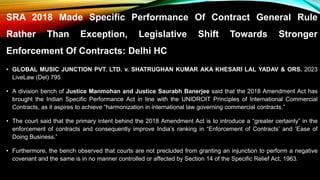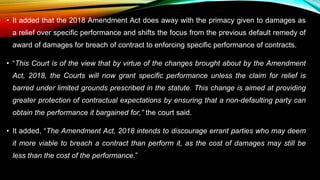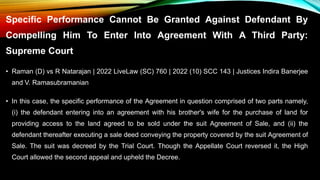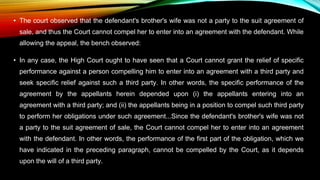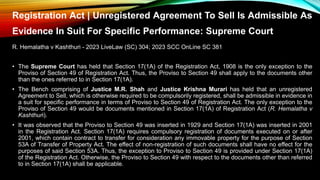The document discusses the Specific Relief Act, 1963 which provides remedies such as specific performance and injunctions. It discusses:
1) The history and background of the Act, replacing an earlier 1877 version to follow the English position on equitable remedy of specific performance.
2) Key sections of the Act are summarized, including sections related to recovery of specific property, suits by persons dispossessed of property, and specific performance of contracts.
3) Amendments to the Act in 2018 are mentioned, changing specific performance of contracts from a discretionary relief to mandatory, while still subject to exceptions in sections 11, 14 and 16.
The summary briefly outlines the purpose of the Specific Relief Act and discusses some important sections
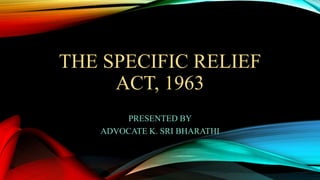
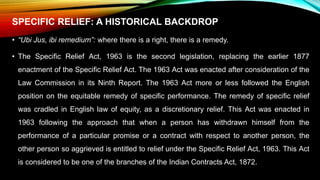
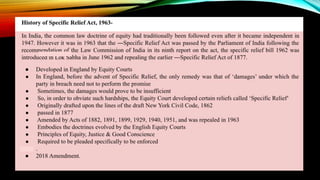
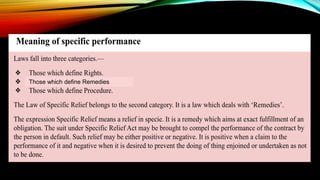
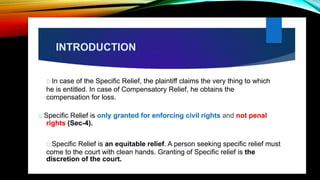
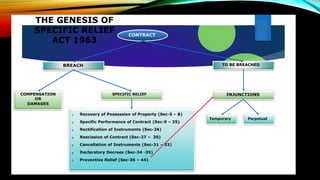
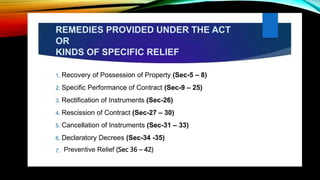
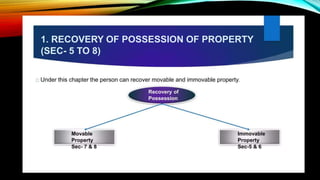
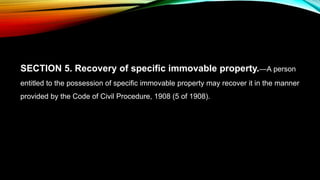
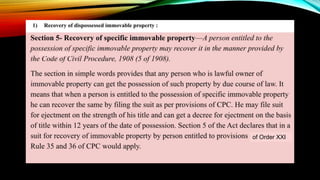
![Section 6. Suit by person dispossessed of immovable property.—
1) If any person is dispossessed without his consent of immovable property otherwise than
in due course of law, he or any person [through whom he has been in possession or any
person] claiming through him may, by suit, recover possession thereof, notwithstanding any
other title that may be set up in such suit.
(2) No suit under this section shall be brought— (a) after the expiry of six months from the
date of dispossession; or (b) against the Government.
(3) No appeal shall lie from any order or decree passed in any suit instituted under this
section, nor shall any review of any such order or decree be allowed.
(4) Nothing in this section shall bar any person from suing to establish his title to such
property and to recover possession thereof.](https://image.slidesharecdn.com/specificreliefactppt-240130060546-e079153c/85/Specific-Relief-Act-Sections-Case-Laws-PPT-pptx-11-320.jpg)
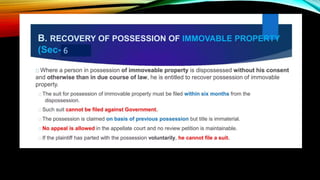
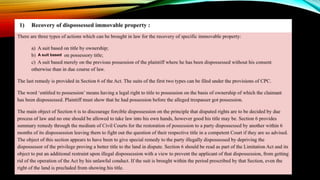
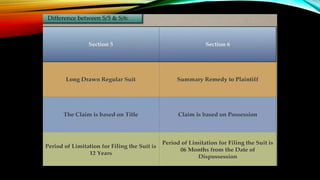
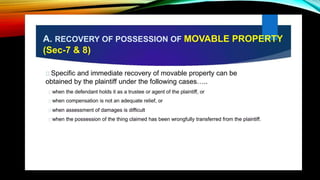
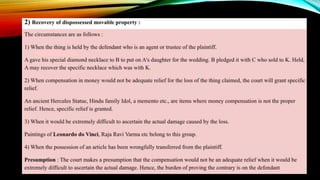
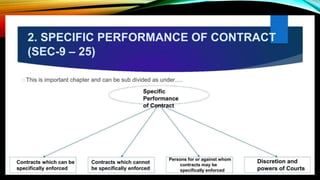
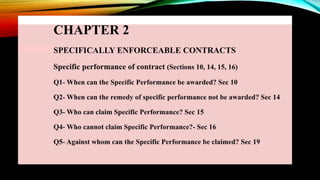
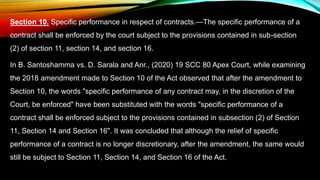
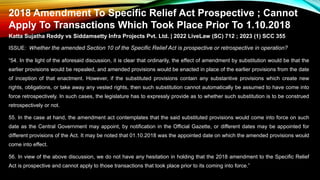
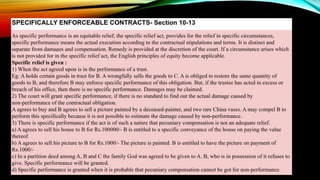
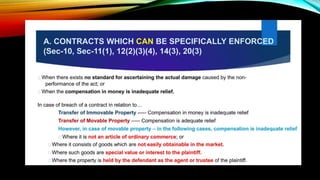
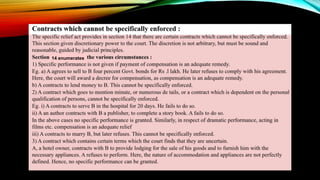
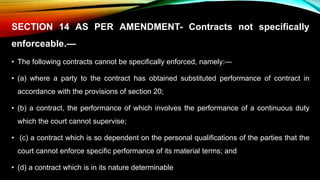
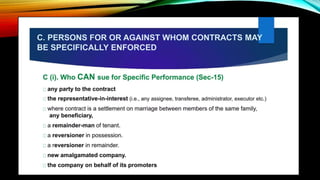
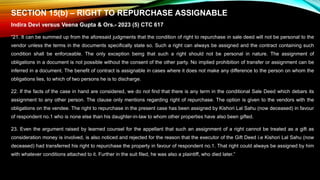
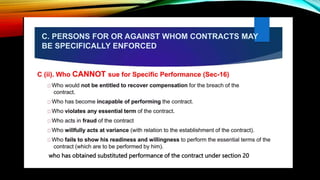
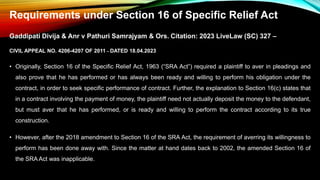
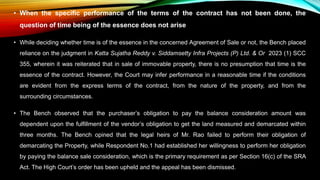
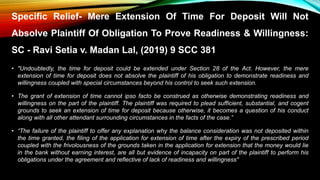
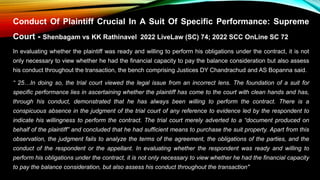
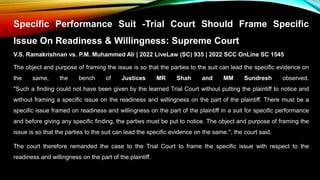
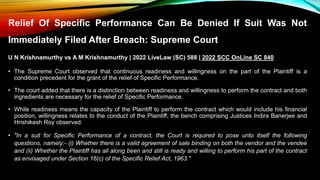
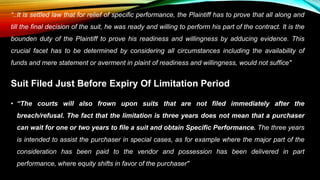
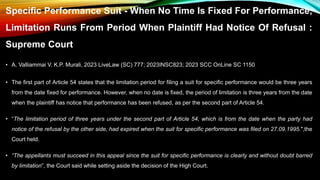
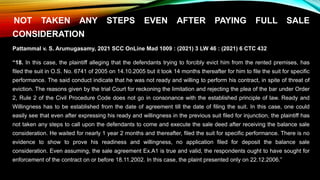
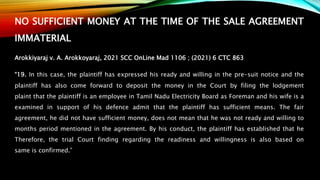
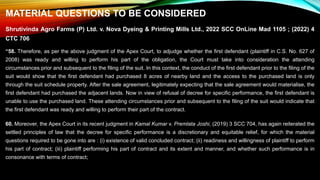
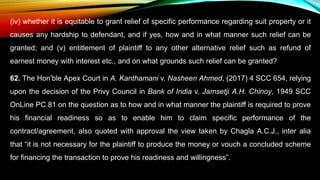
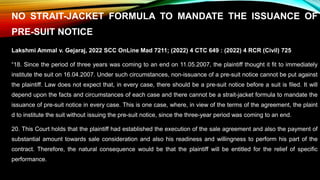
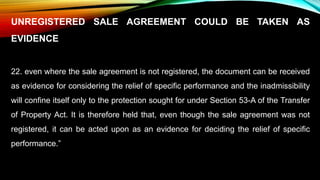
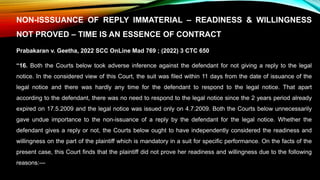
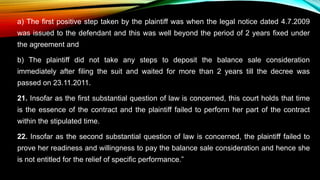
![ARTICLE 54 LIMITATION OF THREE YEARS RUNS FROM THE DATE
STIPULATED IN THE CONTRACT
Suresh Kumar Kankariya v. K. Jigibai, 2022 SCC OnLine Mad 1931; (2022) 3 CTC 501
“35. In the present case, the agreement is dated 14.12.1998 and the time fixed under the agreement was 12
months. If that is taken into consideration, the plaintiff ought to have paid the balance sale consideration on or
before 14.12.1999. This Court has already upheld the finding of the Lower Appellate Court to the effect that
Ex.A3 receipt is a concocted document. Hence, if Ex.A3 is eschewed, the suit ought to be filed within 3 years
from the expiry of the time fixed under the agreement. The suit for specific performance was filed only on
25.2.2004 which is much beyond the period of limitation. At this juncture, it will be relevant to take note of the
Judgment of the Division Bench of this Court in [K. Murali v. M. Mohamed Shaffir] reported in (2020) 1 CTC 38
where Article 54 of the Limitation Act was interpreted by this Court.
36. It is clear from the above judgment that the first part of Article 54 will apply to the facts of the present case.
The limitation begins to run from the date the parties have stipulated for the performance of the contract. ”](https://image.slidesharecdn.com/specificreliefactppt-240130060546-e079153c/85/Specific-Relief-Act-Sections-Case-Laws-PPT-pptx-44-320.jpg)
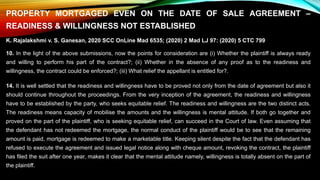
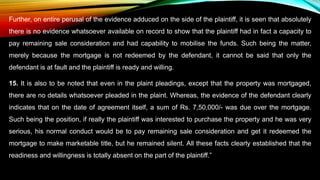
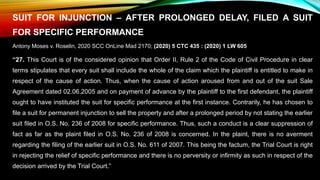
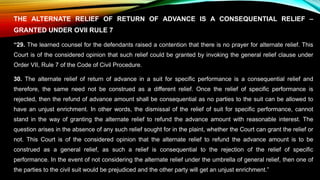
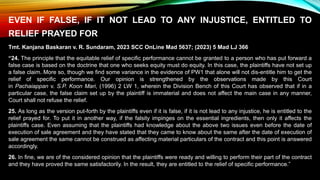
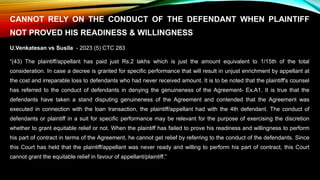
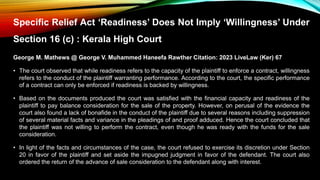
![19. Relief against parties and persons claiming under them by
subsequent title
• (a) either party thereto;
• (b) any other person claiming under him by a title arising subsequently to the contract, except a transferee for value
who has paid his money in good faith and without notice of the original contract;
• (c) any person claiming under a title which, though prior to the contract and known to the plaintiff, might have been
displaced by the defendant;
• [(ca) when a limited liability partnership has entered into a contract and subsequently becomes amalgamated with
another limited liability partnership, the new limited liability partnership which arises out of the amalgamation.]
• (d) when a company has entered into a contract and subsequently becomes amalgamated with another company, the
new company which arises out of the amalgamation;
• (e) when the promoters of a company have, before its incorporation, entered into a contract for the purpose of the
company and such contract is warranted by the terms of the incorporation, the company:
• Provided that the company has accepted the contract and communicated such acceptance to the other party to the
contract.](https://image.slidesharecdn.com/specificreliefactppt-240130060546-e079153c/85/Specific-Relief-Act-Sections-Case-Laws-PPT-pptx-52-320.jpg)
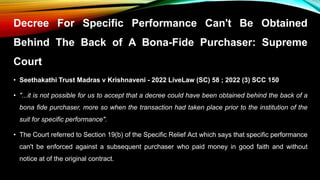
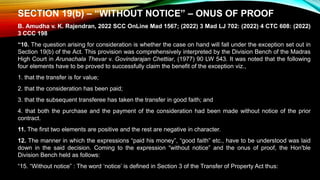
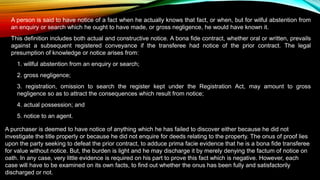
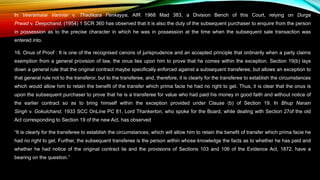
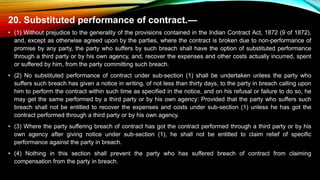
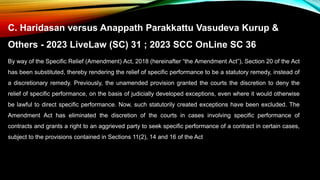
![21. Power to award compensation in certain cases.—
(1) In a suit for specific performance of a contract, the plaintiff may also claim compensation for its breach 1 [in
addition to] such performance.
(2) If, in any such suit, the court decides that specific performance ought not to be granted, but that there is a
contract between the parties which has been broken by the defendant, and that the plaintiff is entitled to
compensation for that breach, it shall award him such compensation accordingly.
(3) If, in any such suit, the court decides that specific performance ought to be granted, but that it is not sufficient
to satisfy the justice of the case, and that some compensation for breach of the contract should also be made to
the plaintiff, it shall award him such compensation accordingly.
(4) In determining the amount of any compensation awarded under this section, the court shall be guided by the
principles specified in section 73 of the Indian Contract Act, 1872 (9 of 1872).
(5) No compensation shall be awarded under this section unless the plaintiff has claimed such compensation in
his plaint: Provided that where the plaintiff has not claimed any such compensation in the plaint, the court shall,
at any stage of the proceeding, allow him to amend the plaint on such terms as may be just, for including a claim
for such compensation.
Explanation.—The circumstances that the contract has become incapable of specific performance does not
preclude the court from exercising the jurisdiction conferred by this section.](https://image.slidesharecdn.com/specificreliefactppt-240130060546-e079153c/85/Specific-Relief-Act-Sections-Case-Laws-PPT-pptx-59-320.jpg)
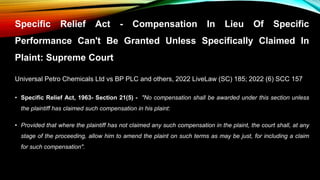
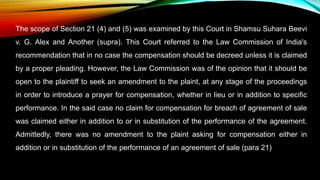
![22. Power to grant relief for possession, partition, refund of earnest
money, etc.—
(1) Notwithstanding anything to the contrary contained in the Code of Civil Procedure,1908 (5 of 1908), any person
suing for the specific performance of a contract for the transfer of immovable property may, in an appropriate case, ask
for—
(a) possession, or partition and separate possession, of the property, in addition to such performance; or
(b) any other relief to which he may be entitled, including the refund of any earnest money or deposit paid or 1 [made by]
him, in case his claim for specific performance is refused.
(2) No relief under clause (a) or clause (b) of sub-section (1) shall be granted by the court unless it has been specifically
claimed:
Provided that where the plaintiff has not claimed any such relief in the plaint, the court shall, at any stage of the
proceeding, allow him to amend the plaint on such terms as may be just for including a claim for such relief.
(3) The power of the court to grant relief under clause (b) of sub-section (1) shall be without prejudice to its powers to
award compensation under section 21](https://image.slidesharecdn.com/specificreliefactppt-240130060546-e079153c/85/Specific-Relief-Act-Sections-Case-Laws-PPT-pptx-62-320.jpg)
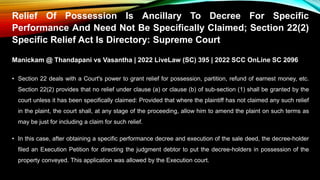
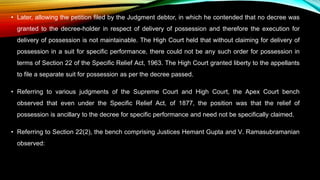
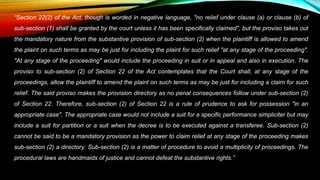
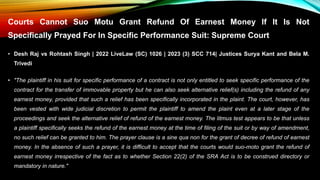
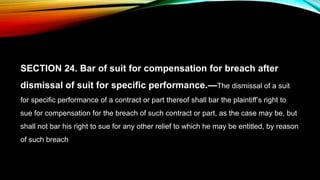
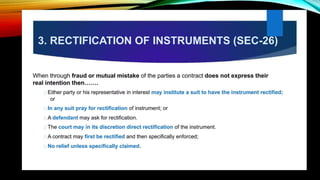
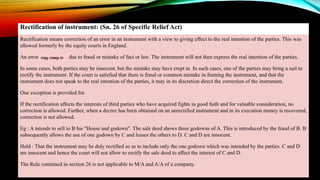
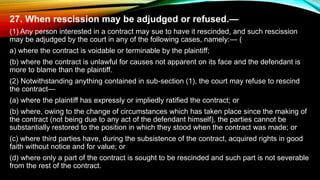
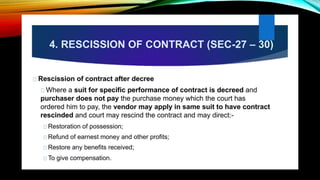
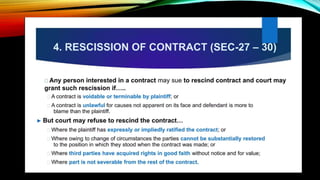
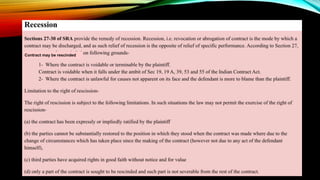
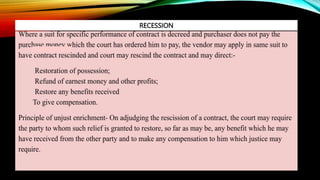
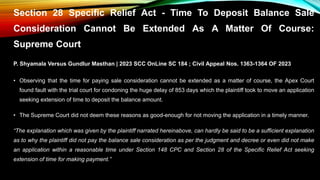
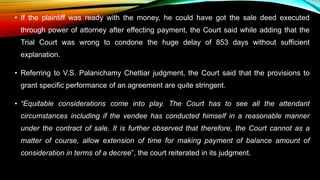
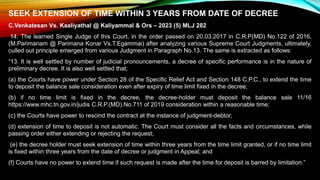
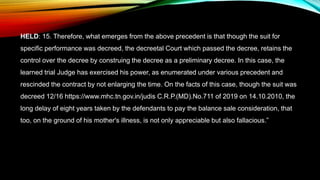
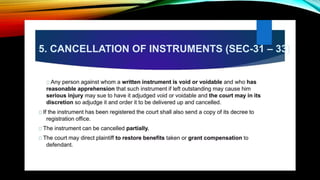
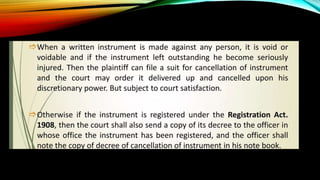
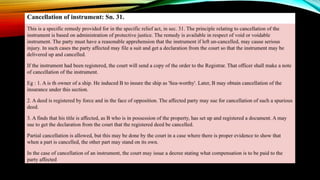
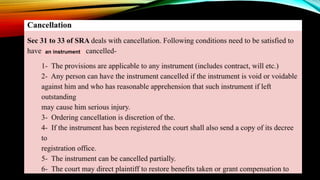
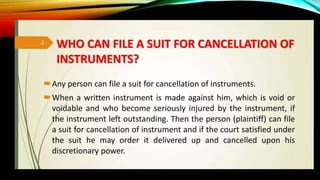
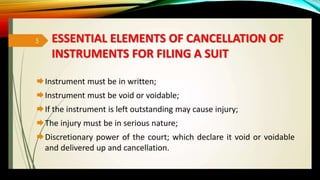
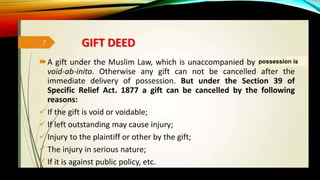
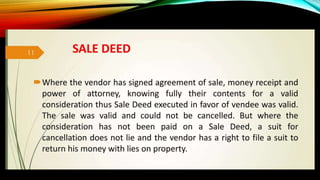
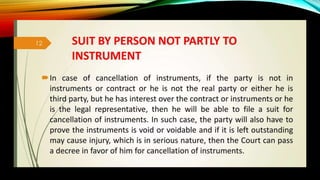
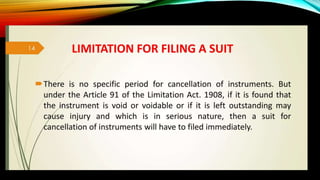
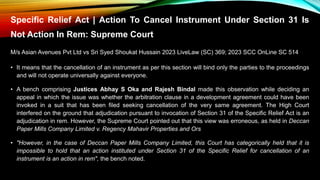
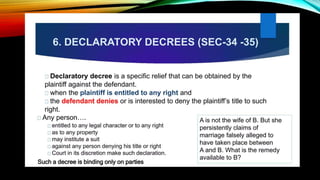
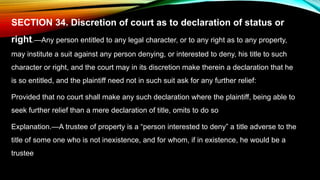
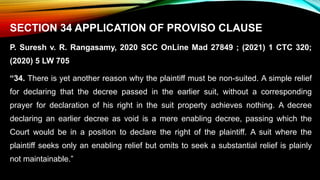
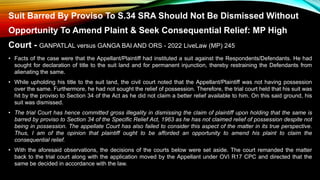
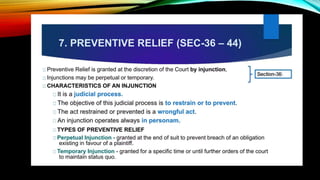
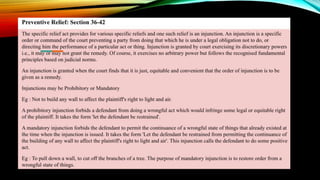
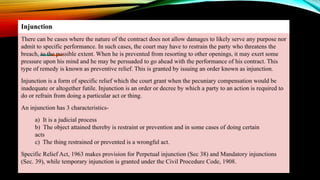
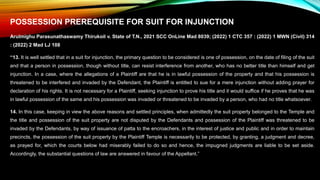
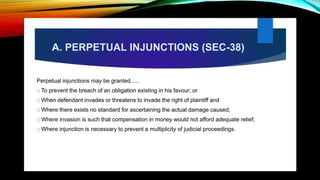
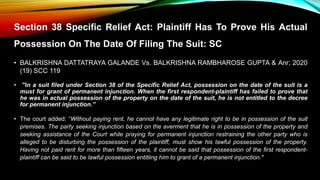
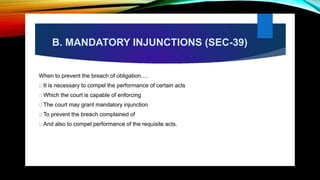
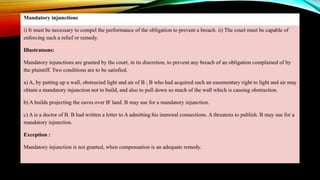
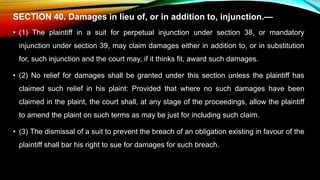
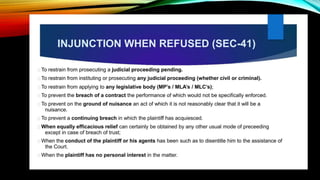
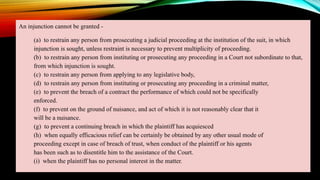
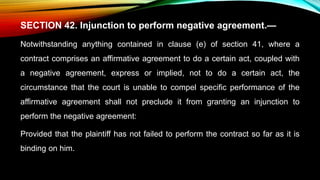
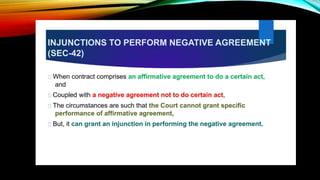
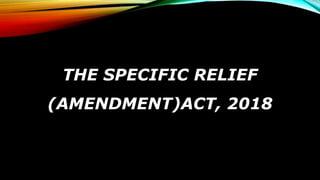
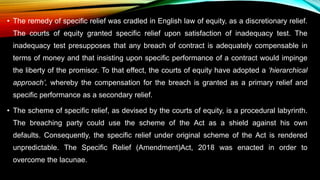
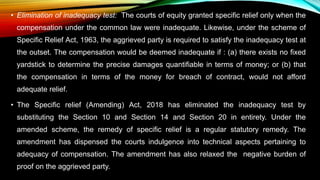
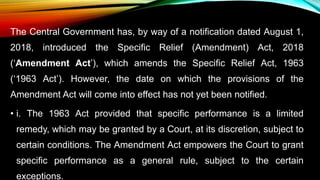
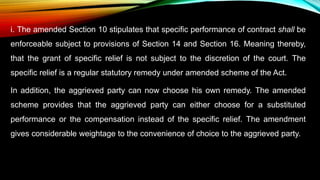
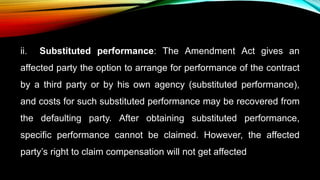
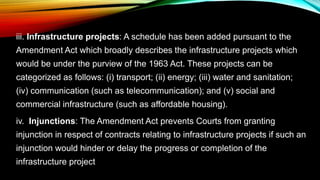
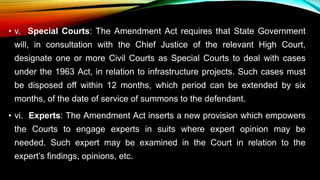
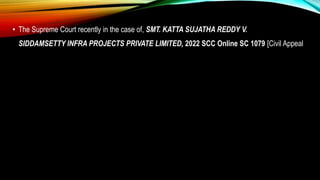
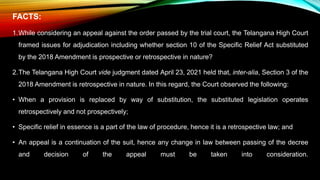
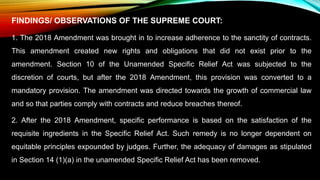
![3. The nature of amendments to a statute determine whether they are procedural or substantive law. For this,
reference to the nature of the parent enactment may not be material. If the substituted provisions contain any
substantive provisions which create new rights, obligations, or take away any vested rights, then such
substitution cannot automatically be assumed to have come into force retrospectively. In such case, the
legislature would have to expressly provide whether such substitution is to be construed retrospectively or not.
4. While considering the 2018 Amendment, it incorporates substantive principles, and for this reason, the
amendments to the Specific Relief Act would apply prospectively.
5. The Court also relied on Shyam Sunder v. Ram Kumar, [(2001) 8 SCC 24], and observed that when a
substantive law is brought about by amendment there is no assumption that it shall take retrospective effect,
unless the legislature expressly clarified the same](https://image.slidesharecdn.com/specificreliefactppt-240130060546-e079153c/85/Specific-Relief-Act-Sections-Case-Laws-PPT-pptx-118-320.jpg)
